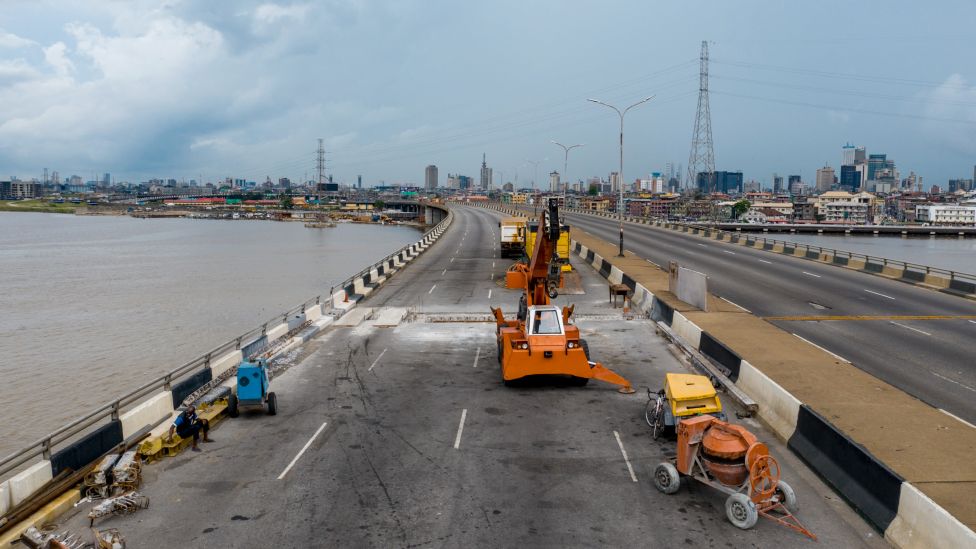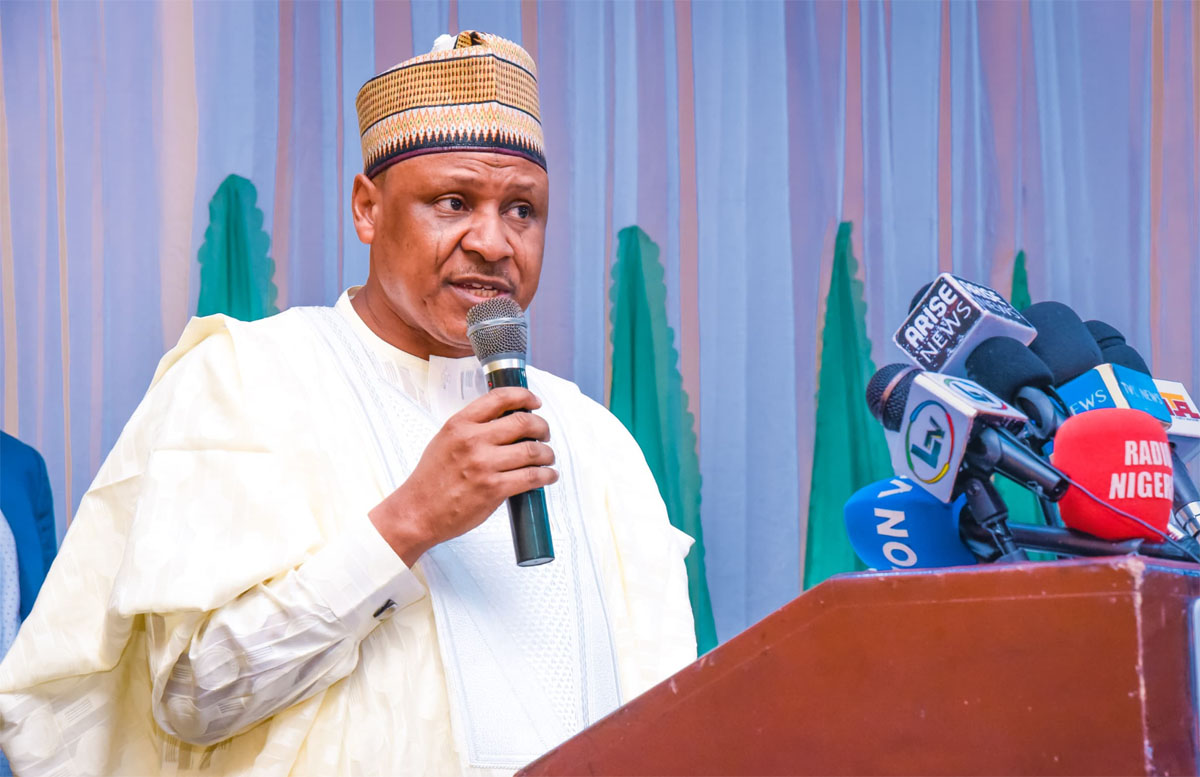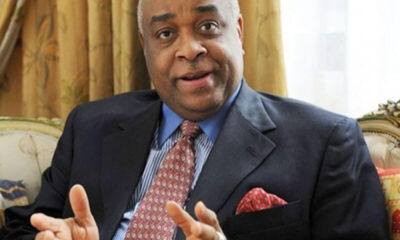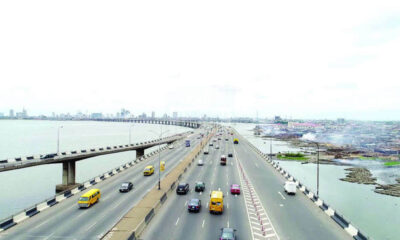News
Third Mainland Bridge now to reopen February ending, says FG

The Federal Government on Sunday said the Third Mainland Bridge would no longer be opened on Monday (tomorrow) but February ending.
Federal Controller of Works in Lagos, Mr Olukayode Popoola, said the bridge would experience one more total closure from February 19 to 21 before completion of the project for the final reopening by the end of February.
The Minister of Works and Housing, Babatunde Fashola, had said the bridge would be reopened by February 15 during an inspection of construction work on major roads and bridges in Lagos State in January.
The minister explained that the EndSARS protest caused the initial extension of the completion date.
Constructed in 1990, the bridge was adjudged as the longest in Africa until 1996 when the October 6 Bridge in Cairo, Egypt was completed.
Popoola said, “Third Mainland Bridge will no longer be opened on the 15th of February 2021 as announced earlier on.
“In order not to create untold hardship for the motoring public using the Third Mainland Bridge for their daily activities, the contractor is not allowed to close the Third Mainland Bridge during the week to cast concrete.
“Lane markings on the completed section must be completed.”
He also said, “The Federal Ministry of Works and Housing regrets the inconveniences the extra days may have caused the Lagosians.”
Popoola explained that the bridge would be totally shut down from midnight on February 19 to 21 to cast concrete on the last expansion joint.
He said that the concrete would require between three and four days to set before the final preparations to finally reopen the entire bridge to traffic.
These processes, he said, could drag to the end of February when the highway would eventually be opened up.
“We are looking at the end of the month for the reopening of the bridge. That is the end of this February,” he added.
He said that work was soon to begin on the casting of the last expansion joint on the bridge before the bridge finally reopens to traffic.
“They will cast concrete on the last expansion joint next weekend. We are not allowed to cast during the week so that the traffic will not be too much for people going to work.
“They will cast next weekend and after casting, we need about three or four days to do post-tensioning. That is why we are looking at end of February completion.
“Casting will be done next weekend for the last expansion joint, it will require total closure of the bridge next weekend just to prevent vibration.
“So if we close the bridge Friday night, then we cast on Saturday by Sunday we will open it. That will be the last total closure to fix the last expansion joint.”
The Third Mainland Bridge going through series of repairs was partially shut on July 24 for another round of rehabilitation work.
Traffic was partially diverted on a stretch of 3.5km where construction is ongoing between Adeniji Adeniji Ramp and Ebute Meta, while different time belts were allotted for traffic diversions on the bridge.
The 11.8km bridge is the longest of the three bridges connecting Lagos Island to the Mainland.
The bridge starts from Oworonshoki, which is linked to the Apapa-Oshodi Expressway and the Lagos-Ibadan Expressway, and ends at the Adeniji Adele Interchange on Lagos Island.
News
BREAKING: Tinubu Decorates Tunji Disu as Acting Inspector‑General of Police

BREAKING: Tinubu Decorates Tunji Disu as Acting Inspector‑General of Police
President Bola Tinubu on Wednesday formally decorated Assistant Inspector-General of Police (AIG) Tunji Disu as acting Inspector-General of Police (IGP) at a ceremony held at the State House in Abuja. The event took place at about 4 p.m. in the President’s office, marking a key leadership transition in the Nigeria Police Force following the resignation of Kayode Egbetokun.
The ceremony was attended by top officials, including the National Security Adviser (NSA), Nuhu Ribadu, the Chief of Staff to the President, Femi Gbajabiamila, the Secretary to the Government of the Federation (SGF), George Akume, and the outgoing IGP, Egbetokun. President Tinubu pinned the new insignia on Disu’s uniform, officially conferring him with the acting rank.
Disu’s appointment comes just 48 days before his scheduled retirement on April 13, 2026, when he would reach the mandatory retirement age of 60. However, under the amended Police Act, which provides a four-year tenure for Inspectors-General of Police regardless of age, Disu may serve as IGP until 2030, allowing him to implement longer-term security and police reforms.
The President commended Egbetokun for his service to the nation, describing his tenure as marked by dedication and professionalism. Egbetokun resigned on Tuesday, citing urgent family matters that required his full attention. Tinubu expressed gratitude for the outgoing IGP’s contribution to strengthening internal security architecture across Nigeria.
READ ALSO:
- Police Corporal, Bus Conductor Get Death Sentence for Kidnapping in Akwa Ibom
- Six Worshippers Abducted in Ondo Church Attack, One Rescued
- Nigerian Man Jailed in UK for Sexually Assaulting Two Women on Trains
Disu’s elevation as acting IGP has also triggered considerations about senior police leadership restructuring. In line with police hierarchy practices, several Deputy Inspectors-General of Police (DIGs) may retire to allow smooth leadership continuity. Observers note that this move ensures stability, operational coherence, and adherence to the chain of command within the Nigeria Police Force.
Legal and procedural steps remain, as the Nigeria Police Council is expected to formally approve Disu’s appointment, which will then be forwarded to the Senate for confirmation. Security analysts have highlighted that Disu’s leadership will be closely monitored, particularly regarding national security management, anti-corruption initiatives, modernization of the police force, and effective crime reduction strategies.
Disu assumes leadership at a time when Nigerians are closely watching the police force’s response to rising security challenges across the country. The government’s swift transition of leadership reflects a commitment to continuity, accountability, and reform in the nation’s primary law enforcement institution.
BREAKING: Tinubu Decorates Tunji Disu as Acting Inspector‑General of Police
News
MURIC Demands Suspension of Olubi School Principal, VPs Over Alleged Religious Discrimination

MURIC Demands Suspension of Olubi School Principal, VPs Over Alleged Religious Discrimination
The Muslim Rights Concern (MURIC) has called for the immediate suspension of the principal and two vice principals of Olubi Memorial Grammar School, Kudeti, Ibadan, following allegations of religious discrimination and administrative misconduct.
In a press release dated February 25, 2026, signed by Ambassador Mallam Ibrahim Agunbiade, MURIC accused the Oyo State Teaching Service Commission (TESCOM), Ibadan Zone 1, and the school management of suppressing the religious rights of Muslim teachers and students.
The human rights organisation claimed that five Muslim teachers were recently transferred after defending the constitutional rights of Muslim students to observe daily prayers and participate in faith-based activities. In total, eight staff members were transferred, including three Christian teachers.
MURIC also condemned a directive allegedly suspending all religious activities within the school premises, calling it disproportionate and discriminatory. “Public schools funded by taxpayers’ money cannot be turned into religious enclaves,” the statement read. “Muslim students have the constitutional right to observe their daily prayers, operate their Muslim Students’ Society (MSSN), wear hijab, and participate equitably in school assemblies.”
The group emphasized that Olubi Memorial Grammar School, formerly known as Urban Day Grammar School, Kudeti, is a government-established institution, not a missionary or denominational school.
READ ALSO:
- Dangote Refinery Signs Off‑Take Deal to Deliver 65m Litres of Petrol Across Nigeria
- Sheikh Gumi Warns Against Airstrikes on Bandits, Backs Forest Security Service
- FG Denies ₦10 Billion Ransom Payment, Affirms Pupils Freed Through Security Operations
Concerns were also raised about the posting of five new teachers on February 23, 2026, of whom four are Christians and only one is a Muslim, teaching Islamic Religious Studies (IRS). MURIC argued that this reflects an imbalance, especially given the need for additional IRS teachers.
MURIC’s Demands
- Immediate suspension of the principal, Pastor Adegbola, Vice Principal (Admin) Mr. Oluwatoyin, and Vice Principal Mrs. Enahoro pending a transparent investigation.
- Redeployment of the five transferred Muslim teachers back to the school.
- Restoration of MSSN activities and equal allocation of assembly days—two for Muslims, two for Christians, and one for general assembly.
- Unhindered observance of Dhur prayers and accommodation for Jumu’ah prayers where feasible.
- Unrestricted use of hijab in line with constitutional provisions and judicial precedents.
- Posting of at least one additional qualified IRS teacher.
- Administrative balance in leadership postings.
- Consideration of reverting the school’s name to Urban Day Grammar School, Kudeti, to reflect its public ownership.
MURIC warned against what it described as the subtle exhibition of religious supremacy in public institutions, urging the Oyo State Government to intervene to prevent further escalation. “We reiterate that MURIC stands for dialogue, not violence. However, silence in the face of oppression is not an option. We shall pursue all lawful and constitutional means to ensure that justice prevails,” the statement added.
As of press time, neither the school officials nor TESCOM had responded publicly to the allegations.
MURIC Demands Suspension of Olubi School Principal, VPs Over Alleged Religious Discrimination
News
FG Denies ₦10 Billion Ransom Payment, Affirms Pupils Freed Through Security Operations

FG Denies ₦10 Billion Ransom Payment, Affirms Pupils Freed Through Security Operations
The Federal Government of Nigeria (FG) has firmly denied reports claiming it paid over ₦10 billion in ransom or released militant commanders to secure the freedom of pupils and staff abducted from St. Mary’s Boarding School, Papiri, Niger State. The government described such claims circulating in some international media outlets as false, baseless, and damaging to national security efforts.
The abduction, which occurred in December 2025, involved nearly 300 students and 12 staff members who were later released safely on December 22. In a statement on Tuesday, Minister of Information and National Orientation, Mohammed Idris, dismissed allegations that ransom was paid or that two senior Boko Haram commanders were freed to secure the release. He stressed that no ransom was paid and no detainees were released, attributing such reports to unnamed intelligence sources.
Idris warned that the claims undermine the professionalism and sacrifices of Nigeria’s security forces, including the Office of the National Security Adviser (ONSA), the Department of State Services (DSS), and the leadership of the National Assembly, all of which had publicly refuted the ransom narrative. He also dismissed stories alleging that ransom funds were delivered by helicopter to insurgents, describing them as fictitious and inconsistent with verified facts.
READ ALSO:
- Lookman Assist Powers Atletico to 7–4 Aggregate Win Over Brugge
- Nigeria Refutes Allegations of Christian Persecution, Reaffirms Religious Freedom
- Osogbo Youths Confer Award of Excellence on Federal Polytechnic Offa Rector, Dr. Kadiri Kamoru
The minister emphasised that the rescue operation was conducted through coordinated intelligence and operational efforts, without bending to criminal extortion. He urged the media to verify facts before publication to avoid emboldening criminals or undermining the morale of security personnel.
Meanwhile, the African Democratic Congress (ADC) has called on the Federal Government to issue a categorical statement clarifying the allegations. In a statement signed by National Publicity Secretary Bolaji Abdullahi, the party warned that any confirmed ransom payment would contradict the Terrorism (Prevention and Prohibition) Act, 2022, which criminalises payments and negotiations with terrorists. The ADC said inconsistency on the matter could erode public confidence and worsen insecurity in Nigeria.
The ADC also highlighted that shortly after the victims’ release, government officials, including the National Security Adviser, Nuhu Ribadu, had categorically stated that ransom payments fuel insecurity and should not occur under any circumstances. The party reiterated that Nigeria cannot claim to discourage ransom payments while rewarding terror networks or incentivising further abductions.
The Federal Government reiterated that the safe release of the pupils and staff was achieved entirely through professional security operations, reflecting the commitment of Nigerian authorities to tackling structured, profit-driven criminal enterprises without compromising national security or the rule of law.
Security agencies have continued to intensify operations against kidnappers and armed criminal networks across Nigeria, recovering ransom money from suspects and preventing further abductions in states including Akure, Ondo State, reinforcing the government’s position that law enforcement and intelligence-led operations remain central to addressing Nigeria’s kidnapping crisis.
FG Denies ₦10 Billion Ransom Payment, Affirms Pupils Freed Through Security Operations
-

 News1 day ago
News1 day agoBREAKING: IGP Kayode Egbetokun Steps Down as Tinubu Names Tunji Disu as New Police Chief
-

 Entertainment11 hours ago
Entertainment11 hours agoNollywood Actor Okemesi Confirmed Dead After Brief Illness
-

 News1 day ago
News1 day agoMother of Three Dies by Suicide After Fiance’s Family Rejects Marriage in Ijebu-Ode
-

 International2 days ago
International2 days agoUS Adds 19 More Nigerians to ‘Worst of the Worst’ Deportation List
-

 News1 day ago
News1 day agoU.S. Congress Submits Report to Trump on Alleged Christian Persecution in Nigeria
-

 metro1 day ago
metro1 day agoOsun Police Launch Investigation into Alleged Student Shooting in Osogbo
-

 Business1 day ago
Business1 day agoCBN Mops Up $190 Million to Slow Rapid Naira Appreciation
-

 metro2 days ago
metro2 days agoFG Arraigns Abuja Pastor-Doctor Over Alleged ₦19m Fraud, Sale of Embryos














You must be logged in to post a comment Login